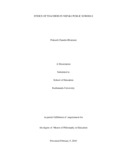
Please use this identifier to cite or link to this item:
https://hdl.handle.net/20.500.14301/418Full metadata record
| DC Field | Value | Language |
|---|---|---|
| dc.contributor.author | Bhattarai, Prakash Chandra | - |
| dc.date.accessioned | 2024-07-18T08:29:27Z | - |
| dc.date.available | 2024-07-18T08:29:27Z | - |
| dc.date.issued | 2010 | - |
| dc.identifier.citation | Bhattarai,P.C.(2010).Ethics of teachers in Nepali public schools. | en_US |
| dc.identifier.uri | https://hdl.handle.net/20.500.14301/418 | - |
| dc.description.abstract | Professional ethics is important aspects in perceiving teacher identity, and therefore, in setting teacher behavior pattern as well as overall development of institutional culture. However, in institutional as well as professional development approaches, professional ethics do not come as a focal priority mainly because there is a lack of adequate understanding regarding how to incorporate and functionalize ethics in development programs. Professional ethics are largely considered to be culminating mainly from within the conscience of the teachers. They are inculcated better in the environment where the concerned actors are aware of and give due consideration to this aspect and where there are appropriate policies and provisions that value and safeguard the aspect. This study was undertaken with the purpose of identifying how teachers’ ethics is perceived and practiced in public secondary schools in Nepal. The study attempted to examine related policy documents, identify perceptions of head-teachers, teachers and students, and identify important practices as well as the issues/challenges. Review of related literature and documents, in-depth interviews and group iii discussions and critical analyses using qualitative methods constituted the main research approach. The study found that there are two policy documents that provide guidelines to maintain teachers’ professional code of conduct, one formulated by the government and the other developed by the Teachers’ Union. The focus of the government document is to bring professional code within the framework of state authority whereas the document developed by the Teachers’ Union focused more on professional integrity and service security of the teachers. Both the documents outlined national level code covering the whole country with uniform ethical codes, the documents failed to address local meaning of ethics. This study also identified some major issues and challenges and drawbacks in the development and implementation of the policies. One aspect of the issues relates to the difficulties in putting the documents into practice. I felt that the issue has arisen because there was a lack of efforts to contextualize the ethics and code to the local milieu. One way to do this is to bring together the representatives from all stakeholders of schools to develop and adopt the ethical codes. There is also a need for sensitive and participatory approach in the development and adoption of the ethical rules so that the stakeholders including the teachers have a ‘feeling of ownership’, responsibility and commitment. At present there are no such provisions to ensure participation of all the stakeholders in the formation of ethical codes of schools. | en_US |
| dc.language.iso | en | en_US |
| dc.publisher | Kathmandu University School of Education | en_US |
| dc.title | Ethics of Teachers in Nepali Public Schools | en_US |
| dc.type | Dissertation | en_US |
| local.school.name | SOED | en_US |
| local.school.department | DODE | en_US |
| local.school.program | MPhil in Development Studies | en_US |
| local.school.level | M.Phil. | en_US |
| Appears in Collections: | Dissertations | |
Files in This Item:
| File | Description | Size | Format | |
|---|---|---|---|---|
| aETHICS OF TEACHERS Prakash1.pdf | 1.38 MB | Adobe PDF |  View/Open |
Items in DSpace are protected by copyright, with all rights reserved, unless otherwise indicated.